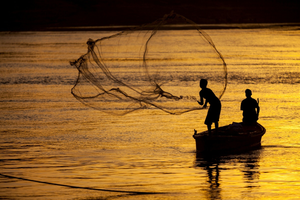Abu Dhabi, Feb 27 (IANS) India reiterated its long-held positions at the World Trade Organization (WTO) negotiations on Tuesday that responsible and sustainable fisheries is a practice ingrained in the ethos and practices of the country’s large and varied fishing community.
India drove home the point that any comprehensive agreement on fisheries subsidies under the WTO ministerial negotiations should keep in mind the interests and welfare of the fishing community that depends on the marine resources for their livelihood and sustenance.
India stressed that historically, while subsidies to the fisheries sector has led to over exploitation, subsidies are also vital for the developing countries and small economies to develop and diversify their fisheries sector as well as to protect the food security and livelihood security of their fishermen.
India also pointed out that this negotiation is linked to the concept of sustainability and as such, any comprehensive agreement on fisheries subsidies should be built on the principles of Common But Differentiated Responsibilities and Respective Capabilities (CBDR- RC).
It should also incorporate the provisions of the Special and Differential Treatment (S&DT) appropriately, as is the case for all WTO agreements.
At the same time, for such an agreement to be effective and forceful in advancing the sustainability objectives, there is an urgent case for capturing non-specific fuel subsidies and transfer of fishing rights to corporate fishing under Government to Government (G2G) payments within the ambit of the disciplines.
Equally important is the need to discipline subsidies given by the Distant Water Fishing Nations as proposed by India.
India urged the members to introduce a moratorium on subsidies by Distant Water Fishing Nations for fishing or fishing-related activities beyond their EEZs for a period of at least 25 years. India said the members should not lose sight of the harmful effects of subsidies for large-scale fishing on sustainable fishing and management of marine resources.
India also explained that the current approaches for addressing Over Capacity and Over Fishing (OCOF) is deeply flawed.
Since the members had agreed to using the affirmative determination approach for negotiating disciplines on the Overfished Pillar, there is no reason why the members should not use the same approach in relation to the OCOF Pillar.
In addition, the current approach of considering the annual aggregate value of subsidies grossly overlooked the intensity of subsidies, and other factors such as the size of the EEZ, long coastal line, population of small fishers and the per capita subsidies to fishermen.
India also reiterated that the sovereign rights of the members for sustainable management of fisheries within their EEZs as provided under the UNCLOS should be duly recognised and protected.
–IANS
sps/arm
Disclaimer
The information contained in this website is for general information purposes only. The information is provided by TodayIndia.news and while we endeavour to keep the information up to date and correct, we make no representations or warranties of any kind, express or implied, about the completeness, accuracy, reliability, suitability or availability with respect to the website or the information, products, services, or related graphics contained on the website for any purpose. Any reliance you place on such information is therefore strictly at your own risk.
In no event will we be liable for any loss or damage including without limitation, indirect or consequential loss or damage, or any loss or damage whatsoever arising from loss of data or profits arising out of, or in connection with, the use of this website.
Through this website you are able to link to other websites which are not under the control of TodayIndia.news We have no control over the nature, content and availability of those sites. The inclusion of any links does not necessarily imply a recommendation or endorse the views expressed within them.
Every effort is made to keep the website up and running smoothly. However, TodayIndia.news takes no responsibility for, and will not be liable for, the website being temporarily unavailable due to technical issues beyond our control.
For any legal details or query please visit original source link given with news or click on Go to Source.
Our translation service aims to offer the most accurate translation possible and we rarely experience any issues with news post. However, as the translation is carried out by third part tool there is a possibility for error to cause the occasional inaccuracy. We therefore require you to accept this disclaimer before confirming any translation news with us.
If you are not willing to accept this disclaimer then we recommend reading news post in its original language.











